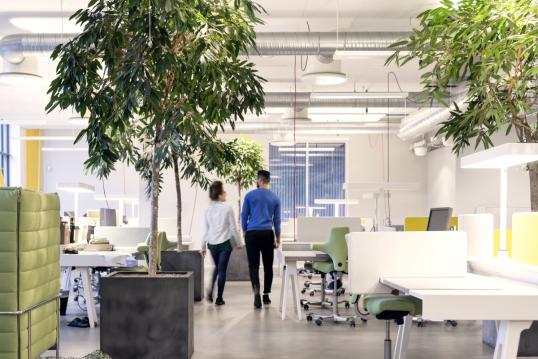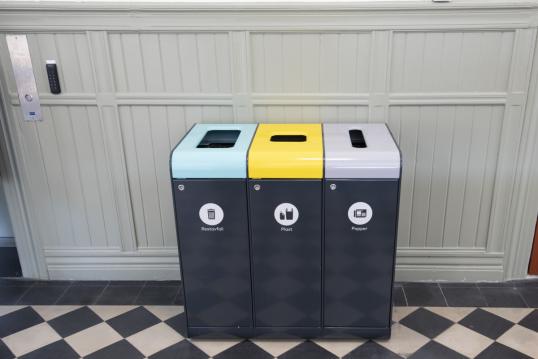Subject matter: Furniture
Environmental and social impacts targeted: Inclusion for people with disabilities/design for all users; circular design and sustainable materials
Relevant EU legislation/policy/guidance: Article 42 of Directive 2014/24/EU; EU GPP criteria for furniture (2017); Public procurement for a circular economy (2017)
Background
Malmö, a vibrant city located in southern Sweden, is the country’s third-largest city with a population of over 330,000 people.
Home to around 180 nationalities, and with one-third of its residents born outside of Sweden, Malmö has a culturally diverse
population. Furthermore, according to Statistics Sweden, about 10% of the population in Sweden aged 16 to 64 years old declare having a disability.
Recognising the importance of promoting diversity and inclusion, the municipality is taking bold steps to ensure that its residents have equal access to public goods and services. The City of Malmö is using universal design principles to improve accessibility, as demonstrated by its 2021 procurement of furniture.
Procurement objectives
In July 2021, Malmö issued a tender for a framework agreement for the supply of furniture which included criteria for universal design. The framework agreement encompasses 12 furniture categories, ranging from outdoor furniture, to storage units, to desks. These include furniture for schools, municipal offices, and other publicly-owned buildings. The framework agreement covers the delivery, assembly, and installation of the furniture, as well as the disassembly and reassembly of the furniture if it needs to be moved from one premise to another. The tendering process followed an open tendering procedure and the framework agreement runs for a period of up to four years.
The principles of Universal Design
To have an inclusive society, products and services should be designed based on the acknowledgement that people have different needs, and their needs may vary over time or depending on their situation. Universal design aims to make physical infrastructure, goods and services accessible to people of all ages, sizes and abilities. For example, a height adjustable desk accommodates users with different seat and table height preferences.
It also allows wheelchair users to sit and work comfortably. Additionally, visual and auditory cues in elevators, such as audible announcements and braille signage, can accommodate individuals with visual or hearing impairments. Not only does universal design minimise the need for assistive technologies and reduce stigma, it can also benefit a wide range of people. As these products can be used and circulated among a greater number of people, it also reduces the need to buy new or specialised products.
The Center for Universal Design at the North Carolina State University has defined the following seven principles of universal design:
- Equitable Use: The design is useful and marketable to people with diverse abilities.
- Flexibility in Use: The design accommodates a wide range of individual preferences and abilities.
- Simple and Intuitive Use: Use of the design is easy to understand, regardless of the user’s experience, knowledge, language skills, or current concentration level.
- Perceptible Information: The design communicates necessary information effectively to the user, regardless of ambient conditions or the user’s sensory abilities.
- Tolerance for Error: The design minimises hazards and the adverse consequences of accidental or unintended actions.
- Low Physical Effort: The design can be used efficiently and comfortably and with a minimum of fatigue.
- Size and Space for Approach and Use: Appropriate size and space is provided for approach, reach, manipulation, and use regardless of user’s body size, posture, or mobility.
For each of these seven principles, the Center for Universal Design has developed guidelines that outline the key design elements that designers should take into consideration to meet the needs of as many users as possible. While improving usability and accessibility is important, designers also need to take into account economic, cultural, gender and environmental considerations in their design process.
Tender requirements
To reduce barriers to participation where possible, the City of Malmö developed procurement criteria to be used in various tenders based on universal design principles.
Malmö’s aim to improve accessibility aligns with several pieces of legislation, such as the UN Convention on the Rights of Persons with Disabilities, and Sweden’s aim to provide equitable living conditions and full participation for people with disabilities. Also, according to Swedish and EU procurement legislation, public procurers must, in certain cases, include
accessibility criteria in their tenders (Article 42 of Directive 2014/24/EU, Paragraph 2 of Chapter 9 of Act (2016:1145) on public procurement).
In the specification, the contracting authority required that the furniture is suitable for people of varying abilities and can be adapted for a variety of personal preferences. The tender document outlined the seven principles of universal design, as defined by North Carolina State University’s Center for Universal Design, and required that the furniture meet at least the first two principles (i.e., equitable use and flexibility in use). Meeting the other five principles was optional and the bidders were asked to explain how the furniture can be adapted to meet the other principles. If the bidders could meet the other five principles, they would receive increased visibility in the City’s e-commerce system.
The suppliers were also required to systematically work with universal design principles, in accordance with the standard SS-EN 17161:2019 “Universal design”, or equivalent. As it was challenging for the contracting authority to define what an accessible furniture is, using this standard was important for the public authority. In the same manner that public authorities can require businesses to have an environmental quality management system in place, encouraging suppliers to actively incorporate universal design principles in a holistic manner in the development of their products and in their business model could have a long-term impact on improving accessibility.
To prove that they integrated elements of universal design in their processes and design of their products, the suppliers were asked to provide the following:
• Identify and provide the name of the person responsible for improving accessibility within the supplier’s organisation throughout the contracting period;
• An outline of the routine processes for how the supplier will in general incorporate accessibility considerations within their products and services;
• A description of the areas within the supplier’s business and their supply of furniture where accessibility can be further improved;
• A description of the goals and measures that the supplier has decided to implement to develop routine processes to promote
accessibility, and when these measures will be implemented;
• An outline of how the supplier will routinely follow up on and update the goals and measures mentioned above;
• A description of how the supplier’s management will routinely follow up on their work to improve accessibility in a more systematic manner.
Environmental criteria
To promote sustainability through procurement, the City of Malmö seeks to purchase products and materials that have a minimal impact on the environment and energy consumption from a life-cycle perspective. This tender built upon Malmö’s past experience with procuring circular furniture. To reduce the impact of the embodied energy of plastics and other materials in the
furniture, the contracting authority required that 50% (by weight) and half the materials in the furniture be made of recycled materials.
The public authority also aimed at minimising the amount of hormone-disrupting substances, as well as chemicals that might pose an environmental and human health risk. The furniture cannot contain substances listed on the current REACH candidate list in concentrations above 0.1% by weight. And if any substances are added to the REACH candidate list during the contracting
period, the manufacture has to present a phasing-out action plan within six months.
To have furniture last as long as possible, a contract performance clause was foreseen for suppliers to provide separate services to upgrade, repaint, repair and replace components that might wear over time. It also had to be possible to dismantle the furniture without special tools into different types of material to enable reuse and/or material recycling at the end-of-life phase.
Results
Embedding universal design principles in the tender had a significant impact on the procurement process. The City of Malmö informed potential bidders about this tender ahead of the procurement procedure. The suppliers were initially reluctant to work with these new criteria. However, once the suppliers started to take into consideration accessibility issues in their design and procedures, they welcomed the new requirements.
Twenty suppliers were admitted to the framework agreement in 2021. The suppliers were selected based on several criteria such as the characteristics and functionality of the furniture, and price, but not on accessibility considerations. In 2022, the suppliers were inquired about how they had systematically incorporated accessibility considerations in the design of their products and their procedures.
The results were positive, as many of the suppliers had incorporated accessibility considerations within their regular quality and design processes. Other suppliers choose to set up separate processes in order to incorporate accessibility considerations into their work. By encouraging suppliers to consider accessibility in a holistic manner can help ensure that suppliers will consider
accessibility in the long-term.
Environmental and social impacts
To better understand how to promote accessibility and include criteria for universal design in tenders, the City of Malmö organised an online workshop with organisations that represent people with disabilities. The workshop helped the municipality gather insights on the barriers that people with disabilities face and identify possible solutions to improve accessibility. The insights gathered from this workshop helped public procurers include accessibility considerations in a tender for conference venues.
The municipality also developed “variety cards” that provide guidance to designers and other people that work on improving accessibility and usability. The cards provide advice on how to reduce barriers caused by sight, hearing, mobility, cognition, allergies and language-related issues. Public procurers and relevant staff should use these variety cards during the procurement process to identify possible technical specifications and award criteria to improve accessibility in tenders. By taking into consideration the needs of a wider range of users, the municipality can ensure that the needs of the most of its residents are met.
Lessons learned
This framework agreement shows that it is possible for public authorities to procure products and services that are both environmentally friendly and inclusive. By embedding requirements for universal design in tenders, public procurers can support diversity and inclusion policies.
There are many different types of disabilities and a range of factors that can prevent people from accessing public goods and services. By taking into account the needs and abilities of a wider group of people, public authorities can ensure that public procurement, and the public goods and services that it provides, benefit more members of society. By engaging early on with organisations that represent people with disabilities, the City of Malmö was able to incorporate criteria that take into consideration the needs of most users.
Many solutions can help to improve accessibility. By encouraging suppliers to systemically take into consideration accessibility issues, the City of Malmö is promoting an integral approach to accessibility and inclusion and ensuring that the approach is sustained in the longer term.
For more information
Contact person: Ulrika Svallingson, Sustainability coordinator for social consideration at City of Malmö
Tender documents: Möbler och inredning (opic.com)
Website: Malmö Stad



